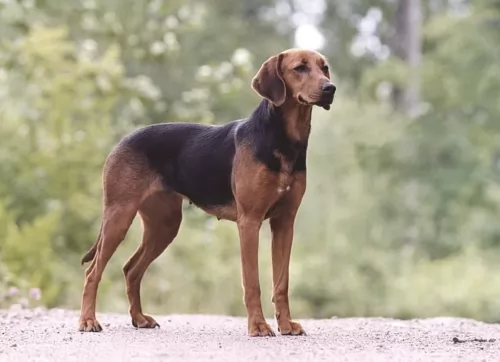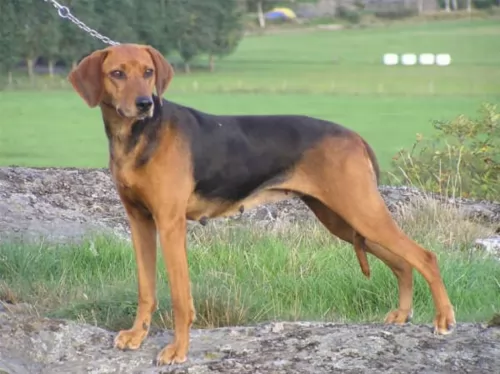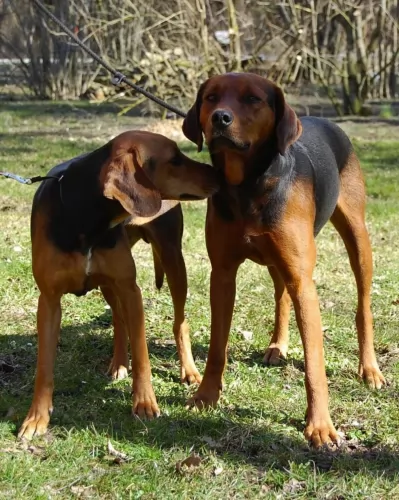 Petzlover
Petzlover Biewer is originated from Germany but Schillerstovare is originated from Sweden. Biewer may grow 39 cm / 15 inches shorter than Schillerstovare. Biewer may weigh 21 kg / 46 pounds lesser than Schillerstovare. Both Biewer and Schillerstovare has same life span. Both Biewer and Schillerstovare has almost same litter size. Biewer requires High Maintenance. But Schillerstovare requires Low Maintenance
Biewer is originated from Germany but Schillerstovare is originated from Sweden. Biewer may grow 39 cm / 15 inches shorter than Schillerstovare. Biewer may weigh 21 kg / 46 pounds lesser than Schillerstovare. Both Biewer and Schillerstovare has same life span. Both Biewer and Schillerstovare has almost same litter size. Biewer requires High Maintenance. But Schillerstovare requires Low Maintenance
 The Biewer is, or was, a piebald Yorkie caused by a recessive gene in a breeding of two Yorkshire Terriers. On Jan 20, 1984 a piebald Yorkshire puppy was born in Hunsruck, Germany to Gertrud and Werner Biewer. The puppy was considered beautiful and the Biewer’s fell in love with it and began a process od selective breeding in an effort to breed piebald Yorkies. Based on a friend’s suggestion, they named this group of puppies, “Biewer Yorkshire Terrier a la Pom Pon”. By 1989 the Allgemeiner Club der Hundefreunde Deurschland (ACH) officially recognized the Biewer Yorkie as a separate breed. Today they are recognized world wide as two separate breeds.
The Biewer is, or was, a piebald Yorkie caused by a recessive gene in a breeding of two Yorkshire Terriers. On Jan 20, 1984 a piebald Yorkshire puppy was born in Hunsruck, Germany to Gertrud and Werner Biewer. The puppy was considered beautiful and the Biewer’s fell in love with it and began a process od selective breeding in an effort to breed piebald Yorkies. Based on a friend’s suggestion, they named this group of puppies, “Biewer Yorkshire Terrier a la Pom Pon”. By 1989 the Allgemeiner Club der Hundefreunde Deurschland (ACH) officially recognized the Biewer Yorkie as a separate breed. Today they are recognized world wide as two separate breeds.
Today there have been genetic studies done that have declared the Biewer Terrier to be a separate and distinct breed from the Yorkshire Terrier, not simply tricolored Yorkies. The BTCA (Biewer Terrier Club of America) changed the name and standard to an original one for the Biewer Terrier. Mrs. Biewer has accepted and signed this revised standard and it is the only one she has accepted. This new standard allows the Biewer Terrier to have a black coat and an undocked tail. In 2014 with the new standard the American Kennel Club Foundation Stock Service (ACK/FSS) accepted the Biewer Terrier. Some breeders still want the breed called the Biewer Yorkshire a la Pom Pon, but Mrs. Biewer has objected to this, insisting the dog is a terrier. The Biewer Breed Club of America (BBCA) insists on the breeding of Biewers only to other Biewers. This is opposed by others who are importing Biewers and breeding them with Yorkies. The result is not recognized as a purebred dog. BBCA breeders do not engage in this type of cross breeding or condone them. The BBCA breeds only dogs that meet the standard set by the BTCA.
The first two Biewers were imported to the States in 2003 by Donna Hall. They made history in 2003, when they were accepted by the IABCA (International All Breed Canine Association) and entered their first dog show. Today they are shown in rare breed dog shows around the world. Today there are two standards in operation for the Biewer as the American Biewer and the North American Kennel Club continue to follow the German standard while the BBCA follow the revised standard approved by Mrs. Biewer.
 The Schillerstövare originated in Sweden, being named after a Swedish farmer, Per Schiller. After he died, the dog was named Schillerstövare in 1907, and was Sweden's first native dog breed.
The Schillerstövare originated in Sweden, being named after a Swedish farmer, Per Schiller. After he died, the dog was named Schillerstövare in 1907, and was Sweden's first native dog breed.
The Swedish Kennel Club recognised this dog in 1907 and it is also recognised by the Federation Cynologique Internationale as well as a number of minor kennels and dog clubs.
The dog has always been used as a hunting dog and the English Foxhound is the e foundation for this breed.
 This long-haired terrier is a neat and compact toy dog. Their hair should be as long as their body is high and hang straight from the bottom of his skull to the end of his tail which is carried upward. He is a well proportioned and powerful little dog. He has no undercoat, but his overcoat is very much like human hair and should be combed. The head is a signature of the Biewer, covered with symmetrical gold, white and blue/black hair. They have flat, small heads and a black nose with an average muzzle. They have intelligent, dark, medium sized eyes and small ears shaped as a V and standing erect. All four legs are straight, and the hips are well formed. They have round feet and an undocked tail.
This long-haired terrier is a neat and compact toy dog. Their hair should be as long as their body is high and hang straight from the bottom of his skull to the end of his tail which is carried upward. He is a well proportioned and powerful little dog. He has no undercoat, but his overcoat is very much like human hair and should be combed. The head is a signature of the Biewer, covered with symmetrical gold, white and blue/black hair. They have flat, small heads and a black nose with an average muzzle. They have intelligent, dark, medium sized eyes and small ears shaped as a V and standing erect. All four legs are straight, and the hips are well formed. They have round feet and an undocked tail.
 The Schillerstövare is a medium to large sized dog. They’re athletic and muscular.
The Schillerstövare is a medium to large sized dog. They’re athletic and muscular.
Standing at between 53–61cm in height and weighing in the region of 18–25kg, the coat of the dog is fairly short and harsh, with the color being black and tan.Sometimes you’ll see some white markings on the chest and paws.
The head is domed, the eyes brown, bright and alert and the ears of the dog are broad, medium length and floppy. The long tail is carried low or held out when running or alert.
If you allow your Schillerstovare to have puppies, you can expect between 3 to 7.
The Schillerstovare is a calm dog but he can get petty lively when there’s a game to be had. He gets on well with well disciplined children who have been taught to be kind and respectful to animals. He also gets on well with pets in the home. Just like with most other dogs, he will need to be trained and socialized as he is a strong willed, confident, dominant dog.
He is friendly and active but will be somewhat reserved around strangers.These dogs will require a lot of exercise and will need quite a bit of space too. They aren't well suited to small properties in the city. He will need a daily walk but also a chance to get off his leash and run free in the park. Other forms of exercise such as hikes, ball game and swimming will delight him.
 The Biewer Terrier loves to be loved and he returns it in volumes. This is a dedicated, fun loving and charming little dog that you can carry around. They are loyal and friendly, athletic and alert. They are barkers when they need to be, but they are not “yappy dogs”. They love toys so make sure they have plenty. They will carry them wherever they go.
The Biewer Terrier loves to be loved and he returns it in volumes. This is a dedicated, fun loving and charming little dog that you can carry around. They are loyal and friendly, athletic and alert. They are barkers when they need to be, but they are not “yappy dogs”. They love toys so make sure they have plenty. They will carry them wherever they go.
 Schillerstovares are social, loving, friendly, loyal dogs who enjoy being around their human family. He’s going to need a lot of exercise, both mental and physical to keep him from boredom and frustration.
Schillerstovares are social, loving, friendly, loyal dogs who enjoy being around their human family. He’s going to need a lot of exercise, both mental and physical to keep him from boredom and frustration.
He will rely on you for at least a daily walk. He is strong-will and confident and will do well in a family where they are active and where they are firm, patient, kind and consistent in their behaviour towards him because then he ticks all th right boxes for being a splendid pet.
 The Biewer Terrier is not a cross breed or hybrid and so does have some of the very serious health issues of the Yorkshire Terrier including the bane of small dogs with liver shunts. Liver shunts are fatal if they are not treated. The breed does have sensitive stomach issues as well. They face other small dog issues like floating patella’s, ear and skin infections. Other than this the Biewer Terrier is a very healthy breed.
The Biewer Terrier is not a cross breed or hybrid and so does have some of the very serious health issues of the Yorkshire Terrier including the bane of small dogs with liver shunts. Liver shunts are fatal if they are not treated. The breed does have sensitive stomach issues as well. They face other small dog issues like floating patella’s, ear and skin infections. Other than this the Biewer Terrier is a very healthy breed.
 Even though your Schillerstovare is a healthy dog breed, hip dysplasia is a common dog disease that many dogs get.
Even though your Schillerstovare is a healthy dog breed, hip dysplasia is a common dog disease that many dogs get.
This is a skeletal disease when a dog’s hip joints become partially dislocated. It can be very difficult for your dog to get around, and he can also develop arthritis. It gets very sad when your dog doesn’t even want to participate in games anymore.
 As previously mentioned the Biewer Terrier has a very sensitive stomach and intestinal system. He should be fed low protein dry dog food. Watch for signs of food allergies such as scratching or chewing on his feet. Feed 2-3 times a day but the Biewer Terrier is one of the few dogs that you can safely free feed unless you notice substantial gaining of weight.
As previously mentioned the Biewer Terrier has a very sensitive stomach and intestinal system. He should be fed low protein dry dog food. Watch for signs of food allergies such as scratching or chewing on his feet. Feed 2-3 times a day but the Biewer Terrier is one of the few dogs that you can safely free feed unless you notice substantial gaining of weight.
Health issues are few as mentioned previously. However, make sure your Briewer’s ears are free of debris and wax, make sure their teeth are brushed and they show no signs of allergies. Along with liver shunts, sensitive intestinal and stomach issues and floating patellas, these are the other minor issues that might occur. Watch for diarrhea and off colored stools.
The Biewer Terrier is an active dog that needs regular exercise and walks. He is a speed demon as his ancestor the Yorkie is and needs an outlet for running as well as daily walks. They love to run, and they love to play. They do great in agility but love adventures. They are smart and love to learn tricks. Since they love hunting vermin they would also excel at Barn Hunt.
 With his short coat, the Schillerstovare is considered a low maintenance dog and requires a minimal amount of grooming. Brushing should be done twice a week to remove loose hair. The harsh outer coat seems to repel dirt and dust.
With his short coat, the Schillerstovare is considered a low maintenance dog and requires a minimal amount of grooming. Brushing should be done twice a week to remove loose hair. The harsh outer coat seems to repel dirt and dust.
Trim your pet’s nails, check inside his ears for signs of redness, make sure his eyes are bright and clear and make sure he doesn’t have any unusual lumps on him.
Make sure his vaccines are up to date to avoid deadly canine diseases. Take him to the vet when you suspect he isn’t his normal self.
Dogs, just like humans, do well on good, nutritious diets. Feed a human lots of junk food and sweets and they’ll grow up to be obese and unhealthy. That's exactly how it is with dogs too. Some of the best commercially manufactured dog foods are convenient and they can be good if you look at the top brands. Look for ones that cater for your dog’s age, size, breed and activity levels. This dry kibble can be made more inviting for your pet when you include some homemade food.
Dogs just want simplicity so that they don’t battle with digestive problems. Boiled chicken, sweet potatoes, brown rice or pasta, carrots and spinach will be wonderful for him when you chop the food up and add it into the dry kibble twice a week. See his tail wag and his brown eyes light up when he smells this treat. Some raw meat added up occasionally will also contribute to your pet’s heath.
Make sure he is never without a constant supply of fresh, cool water.